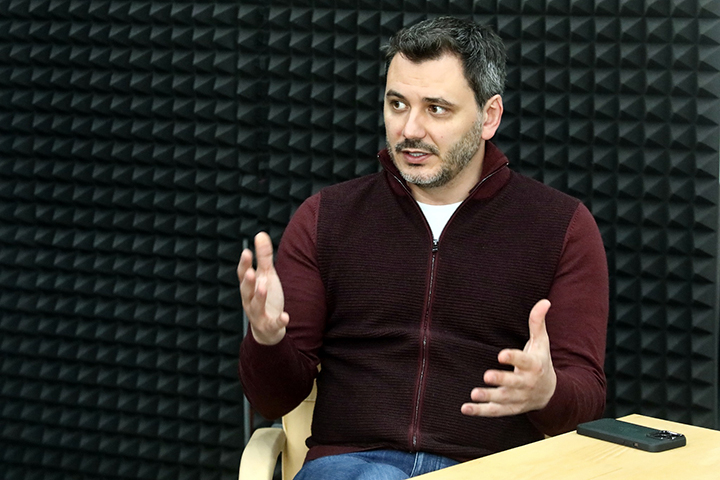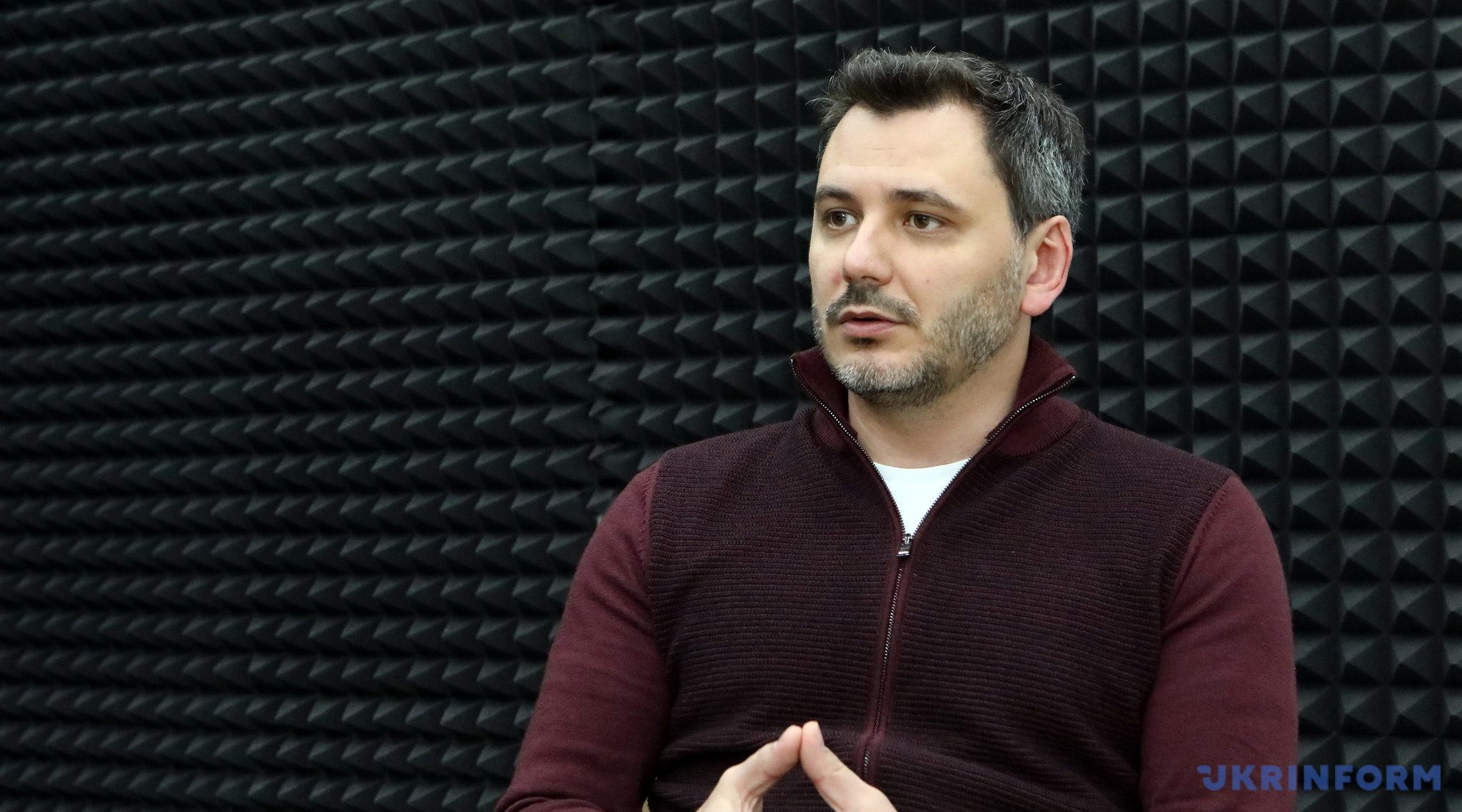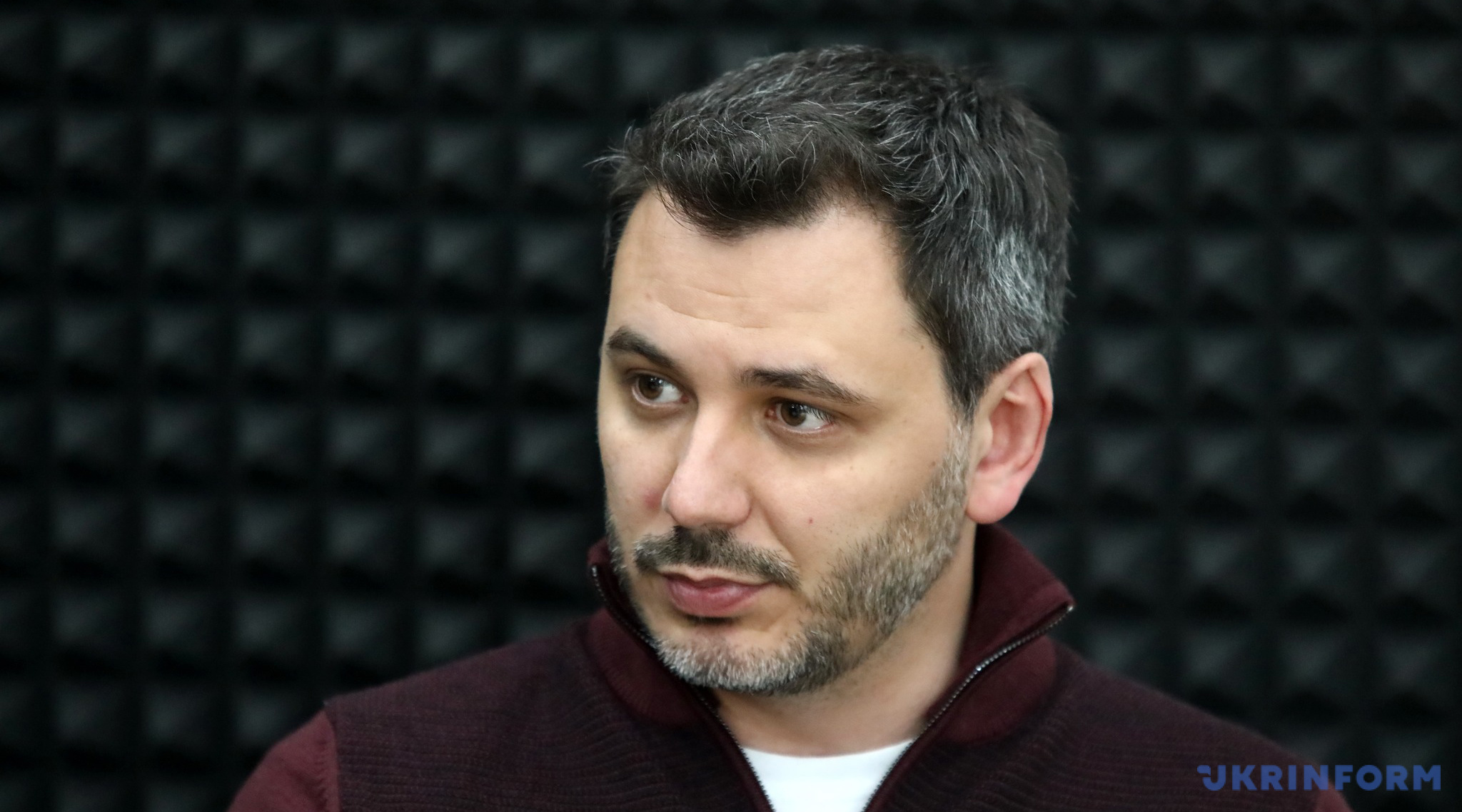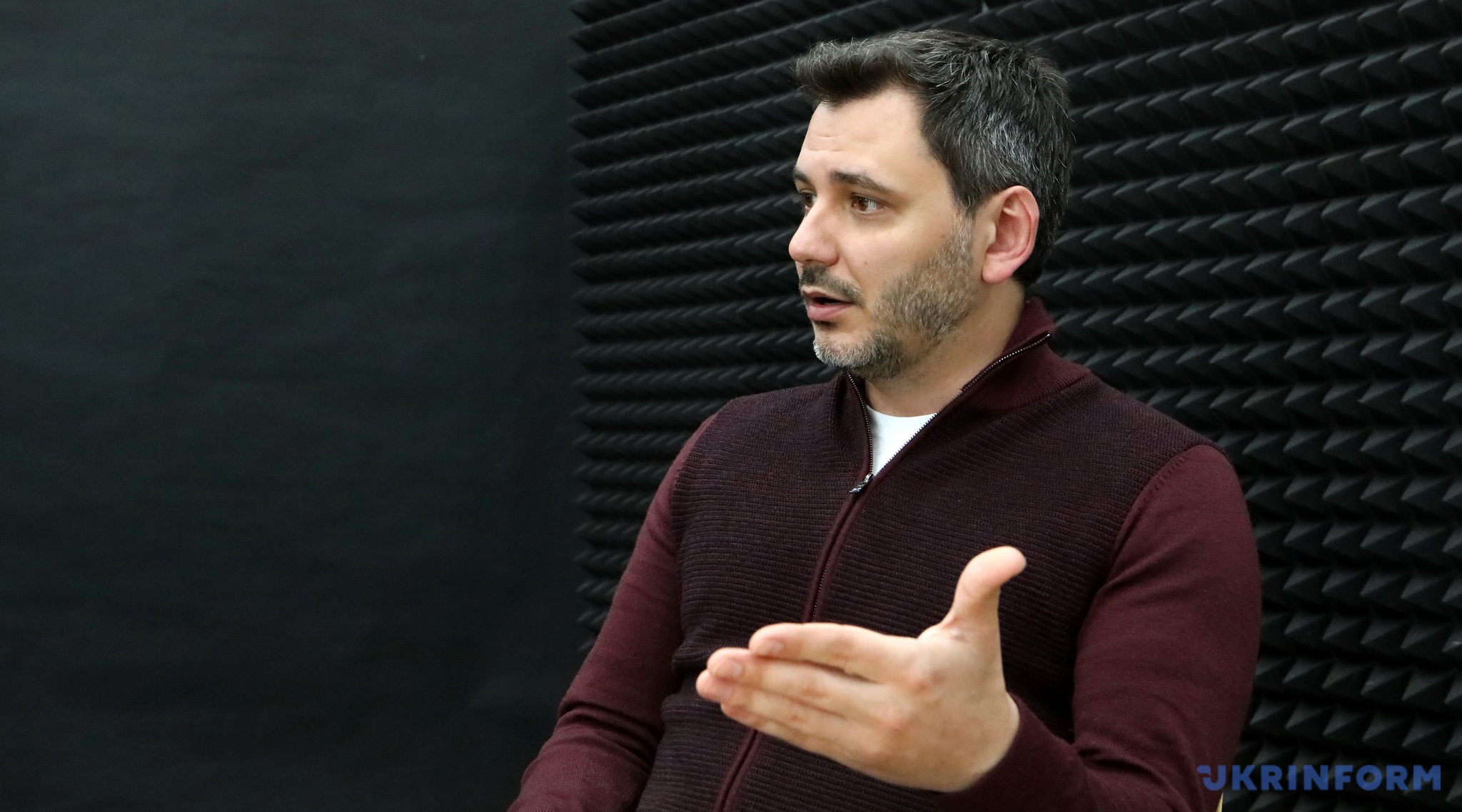The issue of Ukraine's Euro-Atlantic integration has recently become one of the most discussed in society. The Ukrainian authorities are seeking to speed up this process, so they are actively working to adapt legislation and improve the army in accordance with the standards of the North Atlantic Alliance, as well as preparing for the July NATO summit in Vilnius.
Ukrinform spoke with Deputy Chairman of the Verkhovna Rada Committee on National Security, Defense and Intelligence, Head of the Ukrainian delegation to the NATO Parliamentary Assembly Yegor Chernev about preparations for the Vilnius summit, work on Euro-Atlantic integration within the NATO PA, adaptation of Ukrainian legislation to NATO regulations and the process of implementing NATO standards in the work of the Armed Forces of Ukraine.

ONE OF THE MAIN OBSTACLES TO UKRAINE'S INTEGRATION INTO NATO IS THE LACK OF A CONSENSUS POLITICAL DECISION
- The issue of Ukraine's Euro-Atlantic integration is currently one of the most important on the agenda of Ukrainian politicians. Obviously, you often communicate with representatives of NATO member states, in particular within the NATO Parliamentary Assembly, what are their views on Ukraine's integration?
- Let me start by saying that the positions of our partners have changed significantly since February 24, 2022. Before the Russian Federation's full-scale invasion of Ukraine, part of the international community supported our Euro-Atlantic aspirations, while others were skeptical. Now I can't say that there are any skeptics left about Ukraine's accession to NATO.
No one doubts that Ukraine will strengthen NATO and become a border between the Western and barbaric worlds.
There are different visions of how and when member states want to see us in the Alliance. For example, our closest neighbors - the Baltic states, Poland, and the Czech Republic - want to see Ukraine in NATO right now. At the same time, some countries in Central Europe believe that the war in Ukraine should end first.
In my opinion, the question now is not whether Ukraine will join NATO, but when and how. Some countries have different positions on this. However, no one doubts that Ukraine will strengthen NATO and become a border between the Western and barbaric worlds.
- Can you name the main obstacles that hinder Ukraine's Euro-Atlantic integration?
- The North Atlantic Alliance is a military and political bloc. At the moment, the issue of our membership is being considered not so much in the military as in the political sphere, which means that Ukraine needs a political decision and the political will of the member states.
Does Ukraine need to continue to adapt its standards to NATO standards? Yes, it does. Do we need to reform anything else? Yes, of course. However, this is not the main reason for the unwillingness of member states to make a decision on Ukraine's membership. One of the main reasons is the different vision of the terms and conditions of our Euro-Atlantic integration.
I believe that Ukraine's compliance with NATO standards is roughly on par with the average member state, so it has the right to apply for membership in the Alliance right now. Today, there are no technical, legal or other obstacles. All that is needed is the political will and consensus of all NATO member states.

WE ARE TRYING TO PROMOTE UKRAINE'S EURO-ATLANTIC INTEGRATION WITHIN THE NATO PA
- Please tell us about the specific steps for Euro-Atlantic integration that Ukraine is taking within the NATO Parliamentary Assembly (NATO PA).
- The NATO Parliamentary Assembly is not a part of NATO as a structure. It is an advisory body composed of parliamentary delegations from NATO member states and partners. This body can study and recommend something, but it does not directly influence the decision-making process of the country.
However, the work at this level is also important, because the final decisions on a country's membership in NATO are still ratified in the parliaments of member countries after an invitation from the Alliance's headquarters. In addition, in democratic countries, parliaments formulate policies for governments that make decisions. Therefore, by working with delegations from other parliaments, we try to influence the decisions of NATO member governments on Ukraine's further Euro-Atlantic advancement.
- How do you assess the level of cooperation between Ukraine and other NATO PA member states?
- We constantly cooperate with the parliaments of other countries on many issues. For example, the issue of increasing military assistance is discussed at the level of parliaments, governments, and presidents. The situation is similar with economic and political issues. Thanks to this cooperation, we are gradually integrating into the European Union and NATO.
UKRAINE SEEKS ASSURANCES IN THE NATO COMMUNIQUÉ ON JOINING NATO SUBJECT TO SECURITY CONDITIONS
- As you know, the NATO Summit will be held in Vilnius on July 11-12. How will Ukraine be represented at the summit? Tell us about the preparations for this event.
- I hope that the Ukrainian state will be represented at the highest level, i.e. by the President. He has already confirmed his presence at the summit, but I think it will depend on the situation in the country.
How are we preparing for this event? Our task is to advocate our vision of Ukraine's place in the final communiqué of the summit as much as possible. It should contain a clear assurance to our partners that Ukraine will become a NATO member when security conditions allow it. We want Ukraine to become a NATO member as soon as possible after the victory.
Now, at the level of parliaments, in particular within the NATO Parliamentary Assembly, we are conveying this aspiration to our partners so that they can pass it on to their governments. I hope that this will influence the final decision of the Vilnius summit.
We also work in the format of bilateral meetings with various parliaments. Recently, a Ukrainian delegation was in the United States, in Washington, where they met with congressmen. The Americans supported our position on the desired outcome of the summit.
- Most Ukrainian officials, including the top military and political leadership, insist that the Vilnius summit should make a political decision on the timetable for Ukraine's accession to NATO. In your opinion, how realistic is this?
- You know, after February 24, 2022, it became clear to everyone that nothing is impossible. How many dramatic changes in global politics have taken place this year that seemed impossible before. I am convinced that everything is possible. We are asking for the maximum and will do everything to get it.
- What procedure of Euro-Atlantic integration does Ukraine seek? Should we adopt the experience of Finland?
- Before the full-scale invasion, our big goal was to get a Membership Action Plan (MAP) as the penultimate step before joining NATO. Now we are saying that Ukraine does not need a MAP and can be admitted to the Alliance like Finland. In this case, there would be no need to spend years on bureaucratic procedures. At the same time, Ukraine is not abandoning the "homework" that needs to be done on the way to NATO. We are already doing it.

DESPITE THE WAR, UKRAINE IS REFORMING AND WILL CONTINUE TO REFORM
- It is clear that Euro-Atlantic integration requires the adaptation of national legislation to NATO standards. Which sectors of Ukrainian legislation need this most?
- The North Atlantic Alliance has certain principles and standards. NATO standards are more technical conditions that should be implemented at the level of bylaws. They are mostly military, so they are implemented at the level of the Ministry of Defense. This process is ongoing.
NATO principles are actually general approaches to how a state model should be built so that it can cooperate with other members of the Alliance. For example, the principles of civilian democratic control over defense and national security. Ukraine already adheres to them: we have a civilian minister of defense, and strengthened parliamentary control over the security and defense sector.
In addition, Ukraine must comply with the principles of democracy and freedom of speech. The judicial system must be free of corruption. And the level of corruption itself must be significantly reduced. This is a set of reforms that is already being implemented.
At the beginning of each year, we sign a document with NATO headquarters that outlines what needs to be done. Accordingly, at the end of each year, we analyze what has been done and sign a document confirming that certain procedures have been completed. There is no specific list of requirements from NATO Headquarters, but we understand that we need to work on national legislation in all areas.
By the way, these criteria overlap with the requirements for membership in the European Union. That is, as we move towards the European Union, we are also moving towards NATO.
- How do you assess the current efforts of the Verkhovna Rada to adapt Ukrainian legislation to NATO regulations?
- Such documents are constantly being adopted. These may be rather small, at first glance, changes in legislation, for example, to redistribute functions between the General Staff and the Ministry of Defense, but they are also about NATO principles and standards.
These can also be major reforms, including the reform of the Security Service of Ukraine (SBU), which has not yet been approved, but has already been developed. The relevant draft law was passed in the first reading. It has also been finalized for the second reading. I hope that the Verkhovna Rada will adopt it in the near future, because one of the main requirements of our partners is that the special service should perform exclusively anti-terrorist and counterintelligence functions. The goal of the reform is to deprive the SBU of uncharacteristic functions of investigating economic or corruption crimes, as we have other bodies for this purpose.
In addition, in order to get closer to NATO standards, we need to adopt a draft law on state secrets. Currently, classified information in Ukraine is classified according to post-Soviet standards, if not Soviet standards. We need to introduce changes in this area following the example of NATO, which has a specific gradation of documents according to the degree of secrecy.
The draft law has already been developed, and it will allow us to implement a new model of the state secret system, as well as to harmonize legislation in this area with the requirements of NATO and EU security standards. The draft law provides for the transition to a four-stage system of access control, the creation of a state system for the protection of classified information, the establishment of the National Security Agency, and the regulation of its functioning.
This is not just a transition to some other standards. This is information protection, rules for working with information and rules for sharing it. Without these changes, we will not be able to exchange classified data with our partners, which means we will not be able to be 100% interoperable.
By the way, representatives of partner countries, including NATO Secretary General Jens Stoltenberg, emphasize that, despite the war, Ukraine is reforming and will continue to reform. The process of adapting Ukrainian legislation to NATO standards is ongoing.

- What are the difficulties along the way? How can they be overcome?
- The parliament has a single position on European and Euro-Atlantic integration. As a rule, all necessary draft laws are adopted by a majority vote. We are making significant progress.
The so-called "homework" on Euro-Atlantic integration is being done faster and easier than our partners are making decisions. We all understand that it is primarily Ukraine itself that needs to adapt its legislation to NATO standards, so there are no particular obstacles, it is only a matter of time. It is more difficult to convince our partners that Ukraine should be invited to join NATO as soon as possible, and then become a member...
- Is there any cooperation with specialists and experts from NATO member states to ensure proper adaptation of Ukrainian legislation?
- We cooperate with experts from different countries. For example, during the development of the draft law on the reform of the Security Service of Ukraine, we consulted with partners from NATO and the European Union. We constantly communicate with them. By the way, we seek expert assistance ourselves, because we understand that this contributes to high-quality integration into the unions.
CURRENTLY, UKRAINE EXCEEDS MOST NATO MEMBER STATES IN TERMS OF CRITERIA AND STANDARDS OF THE ARMY
- Regarding the adaptation of the Armed Forces of Ukraine to the standards of the North Atlantic Alliance. What practical examples of successful implementation of NATO standards already exist in the Ukrainian army?
- One of the newest components of the Armed Forces of Ukraine, the Special Operations Forces, is fully built on NATO principles and standards. Other branches of the armed forces partially meet these standards.
We have already implemented standards related to military ranks, data exchange, and weapons. We switched to NATO ranks a few years ago. We have also distributed powers between the Ministry of Defense and the General Staff. I would not say that we are close to completing the adaptation of the Armed Forces of Ukraine to NATO standards, but this process is ongoing.
Currently, 60% of the budget is allocated to the army
We are now moving to NATO standards in training the military. They train in battalions, and sometimes entire brigades, abroad: in Poland, the United Kingdom, the United States, Canada, and other countries. We are also rapidly transitioning to Western-style weapons that meet Alliance standards.
I believe that Ukraine is currently ahead of most NATO countries in terms of army criteria and standards.
- What steps does the government plan to take to secure funding for the resources needed to adapt the Ukrainian army to Alliance standards?
It is necessary to create our own navy to perform patrolling and security functions in the Black and Azov Seas
- Currently, 60% of the budget is allocated to the army. The lion's share of this money is spent on military salaries, their support, weapons, and ammunition. But at the same time, despite the war, we are reforming and gradually moving to NATO standards. Some standards require additional funding, some require changes within the Armed Forces or the Ministry of Defense. I think we can do it on our own, without help from international partners.
At the same time, we have quite a lot of "homework" related to access to the sea, i.e. we need to create our own navy to perform patrolling and security functions in the Black and Azov Seas. If NATO member states see us as one of the participants in this security process, of course, we will need additional money to build a fleet. But this is a matter for the post-war future.

UKRAINE'S MEMBERSHIP IN NATO WILL STRENGTHEN THE ALLIANCE, NOT CREATE NEW THREATS
- Finally, I would like to ask you to predict the future post-war security architecture in the Euro-Atlantic region.
If we do not put an end to this war with Ukraine's membership in NATO, the war may happen again
- The war in Ukraine is not a war between Russia and Ukraine, it is a war between the authoritarian world and democracy. Losing this war will be very costly for our partners. In fact, it will mean that the borders of countries will be revised, and authoritarian countries will become stronger and push democratic ones out of the world arena. We can imagine the chaos this will cause. That is why countries around the world are helping us win this war.
At the same time, if we do not put an end to this war by Ukraine's membership in NATO, it may happen again. Unfortunately, we have almost 400 years of common unpleasant history with the Russian Empire, the USSR, and the Russian Federation. And this history confirms that the invader does not change. It is an aggressive neighbor that will constantly try to attack neighboring countries. The only way to avoid this is to take Ukraine into NATO.
Ukraine can and will become a border, a shield to protect Europe and the Euro-Atlantic community from the Russians
There can be no gray areas in Europe. There must be a concrete division between the Western and barbaric worlds. Ukraine can and will become that border, that shield to protect Europe and the Euro-Atlantic community from the Russians. We have proven that we can stop them. This means that Ukraine's membership will strengthen the Alliance, not create new threats.
One of the reasons why some countries are hesitant to grant Ukraine membership is because they think it could bring war to NATO territory. This is nonsense, because Russia clearly understands its capabilities and those of the North Atlantic Alliance. They will definitely not cross the NATO border.
We are trying to convey to our partners that in order to guarantee security in the future, it is necessary to revise the current security architecture in the Euro-Atlantic community, including Ukraine as one of the main guarantors of security in the Eastern European region.
Maryna Shykarenko, Kyiv
Photo by Volodymyr Tarasov

